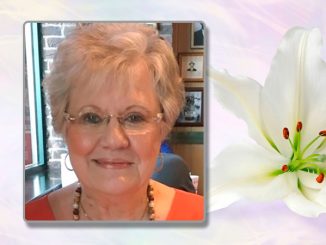
Dead witness’ aunt speaks out
With former St. Charles District Attorney Harry Morel facing sentencing after pleading guilty to obstructing justice, Sheriff Greg Champagne’s response was the “wheels of justice may seem to turn slowly, but with the right people in charge they will turn.”
Morel, 73, was charged with one count of obstruction of justice on April 5 for harassing a grand jury witness with evidence linking him to allegations that he was trading leniency for sexual favors. Two weeks later, he pleaded guilty to the federal charge and now faces sentencing on Aug. 17 of up to three years in prison and a $250,000 fine as part of a plea agreement.
Morel’s attorney, Ralph Capitelli, could not be reached for comment as of press time.
But Champagne said he initiated the FBI investigation into Morel when he started providing evidence to the federal agency in 2009. His office continued to work with the FBI and U.S. Attorney’s Office for years on the case that led to the parish’s former district attorney pleading guilty.
Although it’s been suggested the investigation into Morel was politically motivated, the sheriff questioned what else should have been done when he started getting calls accusing Morel of trading leniency for sex.
“I don’t like Harry because I don’t like him,” Champagne said. “I don’t like sexual predators.”
The first call came from someone on behalf of a woman who claimed she approached Morel for help on her husband’s DWI case, Champagne said. Morel told her it could be “taken care of” if she agreed to meet him at his camp in Mississippi on the following weekend to “play” while her husband was still in jail. She refused and reported the encounter to the St. Charles Parish Sheriff’s Office.
Champagne reported the call to the FBI and Special-Agent-in-Charge Dave Welker authorized an investigation.
A few months later, the Sheriff’s Office received a 911 call from Danelle Keim (last name McGovern at the time), who alleged Morel sexually assaulted her at her St. Rose apartment. She said Morel pressed her to come by her home to discuss Keim’s DWI case.
Champagne said this is when Keim began assisting the FBI investigation.
Her recorded 911 call and police report focused on her allegations that Morel sexually assaulted her and became critical evidence in the case.
Later calls were recorded between the two.
Keim was wearing an FBI wire that documented Morel repeatedly urging her to destroy a camera memory card with photographs showing both their vehicles at the St. Charles Parish Courthouse and Satellite Office in the evening, which became cornerstone evidence in Morel’s obstruction of justice charge.
These discussions were transcribed in a 15-page case summary that documented Morel’s attempts to eliminate evidence that he knew could be used against him in the investigation.By January 2013, the FBI searched Morel’s office at the St. Charles Parish Courthouse and found a package for a memory card reader on his desk, according to court documents. He was served with a grand jury subpoena for the card and Morel surrendered it.
On Tuesday, Keim’s aunt, Brenda Parker of Kentwood, called her niece “the bravest women I know.”
Parker added, “I don’t know of anyone who would come forward the way she did. She trusted Harry Morel and he took advantage of her and corrupted his position as DA.”
She said she doesn’t believe justice has been served when it comes to Morel, who she called “a vile, sorry excuse for a DA.”
But Parker was grateful that Keim’s story has been heard.Morel stepped down as DA in 2012 to make way for his daughter, Michele Morel, to run for a district judge seat.
Joel Chaisson was named DA and Morel stayed on as an assistant DA until Chaisson said he asked him to resign after the FBI searched Morel’s office.
“The allegations in the factual basis against Mr. Morel regarding the trading of leniency for sexual favors predated his employment in my office,” Chaisson said. “And, obviously, had I known about it, he would not have remained with the District Attorney’s office once I became DA.”In February 2013, Keim was found dead from an apparent drug overdose at her St. Rose apartment and it surfaced then that she had been aiding the FBI investigation.
At Keim’s funeral, Parker recounted, “Somebody said this isn’t the last we’ve heard from Danelle – and, boy, were they right.”
Until her death, Parker said her niece was “a beautiful, young mother trying to get her life back on track.” She’d gotten her own apartment, finished drug court successfully and was about to get her 7-year-old son back, she said. “She was totally straight – no alcohol, no drugs, no nothing,” she said.
But then Keim and her boyfriend, Matthew Savoie, used Molly, a synthetic ecstasy that apparently killed her.
“She had help overdosing … I’ll just put it that way,” Parker said, adding, that she told Savoie at his trial that “I knew he murdered her.”
Savoie was sentenced to 15 years in prison for providing Keim the drug.
But Parker said Keim’s family was unhappy with Morel’s obstruction charge and plea deal.
“We were all hoping for him to get more [jail] time or a sex charge,” she said. “That way, he would have to file as a sex offender the rest of his life. Shame on the judge and prosecutor for accepting the deal.”
“He was well respected in St. Charles Parish,” Parker said. “Then, you find out he’s doing all this behind his desk. It’s just not right.”
Throughout the case, Parker maintained they never doubted Keim’s allegations against him. They also didn’t know she was working with the FBI until a month or two before her death.“I just thought it was awesome,” Parker said. “I’m so proud to call her my niece. She did something nobody else would do. She’s the one who stood her ground and she pretty much died for it.”
A year after Keim’s death, the name of an alleged second victim, Melissa Silvestri, also surfaced in the Morel case. She also had died of an apparent drug overdose.
Although Keim had become the most notable figure in the case, Champagne emphasized it was also based on evidence from at least 20 women that lent to Morel being labeled “a sexual predator.”
And this number could still be growing.
Champagne said he got an April 25 phone call from someone naming still another potential victim in Morel’s case.The sheriff emphasized that Keim is “a small part of a pattern of criminal behavior” that surfaced in the FBI’s continuing investigation on Morel.
As the years progressed, Champagne said the federal agency’s thorough and extensive review of thousands of court documents including child support and DWIs subpoenaed from the Clerk of Court office took time toward building a case.Champagne said they also dealt with obstacles in the U.S. Attorney’s Office.
While U.S. Attorney Jim Letten for the Eastern District of Louisiana at the time was pursuing the Morel case, Letten resigned in December 2012 amid a scandal where two of his top deputies were exposed using the Internet to attack people being investigated by their office.
Interim U.S. Attorney Dana Boente declined the Morel case. By December 2013, Kenneth Polite Jr., who had been appointed to the position by President Barrack Obama, said he’d reconsider the investigation and then pursued it.
Champagne said it meant rebuilding the case from scratch and that also took time.
It wasn’t until April 5 that Polite announced Morel had accepted a deal in return for pleading guilty to obstruction of justice.According to Champagne, “The investigation uncovered that over many years, dozens of women reported similar stories.During the most vulnerable times in their lives they were victimized by Morel and pressured to provide sex in return for leniency. In at least three cases, this leniency consisted of Morel obtaining falsified community service letters from a local businessman.”
Throughout this time, however, the sheriff said they could not comment about an ongoing investigation.
Additionally, Champagne knew Morel better than most having worked for him as an assistant DA from 1982 to 1996.“I had no idea he was soliciting women charged for sexual favors,” he said of his time in the DA office. “I had a funny feeling and decided to make the move. I couldn’t put a finger on it at the time. Something didn’t feel right.”
By 1995, Champagne said he had decided to make the career move of running for sheriff and Morel supported his first run for the office.
As the investigation into Morel unfolded, Champagne said the extent of his criminal behavior “was worse than we had thought” when numerous women either approached the Sheriff’s Office with evidence or were identified by the FBI as subpoenaed records revealed their involvement.
“It was disgusting,” he said. “This is worse than taking bribes – trading sex is dehumanizing … doing it with women who live on the fringe of society. Your freedom is literally in his control.”
With Morel facing sentencing, Champagne said the important message now is that it’s not only important to report public corruption but to reasonably assume something will be done about it if justified.
“To all the women who were victimized by this predator and bared your souls: All of you need to understand that you were and are victims,” the sheriff said. “Don’t let anyone tell you otherwise. You are victims.”




Be the first to comment